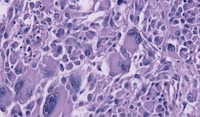A new way to improve glioblastoma treatments that could help dogs and people
From FierceAnimalHealth: The chemotherapy drug temozolomide (TMZ) can be quite effective in patients with glioblastoma, a deadly form of brain cancer, but virtually all patients eventually become resistant to it. Now scientists from the Virginia Tech Carilion Research Institute believe they have discovered a way to resensitize glioblastoma cells to the treatment–and they’re turning to pet dogs that have developed the same type of brain tumor to help prove it.
The scientists discovered that glioblastoma cells have abnormally high levels of a protein called connexin 43. “The higher the connexin 43 levels, the quicker the cancer cells become resistant to TMZ,” said Robert Gourdie, director of the Virginia Tech Carilion Research Institute’s Center for Heart and Regenerative Medicine Research, in a press release. Gourdie was doing heart research when he observed that connexin 43 facilitates cell signaling, but that the process can become overactive in cells that are damaged by disease.
So Gourdie and his team developed a peptide called aCT1 to inhibit that overactivity. Read more here.

